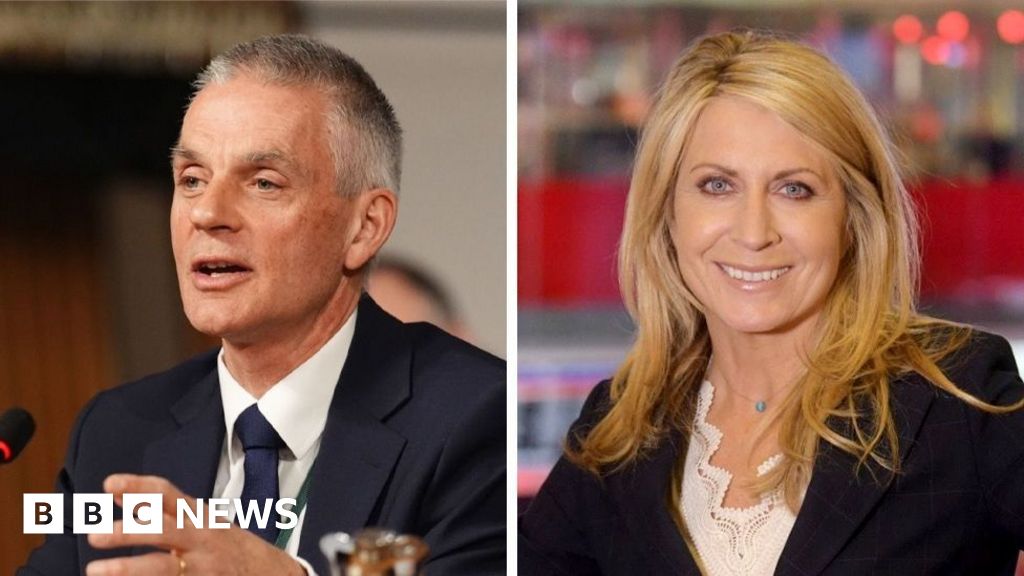director general and News CEO resign over Trump documentary edit

BBC Director General Tim Davie Resigns Over Edited Trump Documentary
BBC Director General Tim Davie and CEO of News Deborah Turness have resigned following intense scrutiny over a Panorama documentary that significantly altered a speech by former US President Donald Trump. The resignations, announced Sunday evening, come amidst growing concerns about impartiality and editorial standards at the public broadcaster.
The controversy centers on the editing of Trump's speech on January 6, 2021, prior to the Capitol Hill riot. An internal BBC memo, leaked to The Telegraph, revealed that the documentary spliced together two separate parts of the speech, creating the impression that Trump explicitly encouraged the storming of the Capitol. The edited version presented Trump saying, "We're going to walk down to the Capitol... and I'll be there with you. And we fight. We fight like hell," while the original segments were spoken more than 50 minutes apart.
Davie and Turness Take Responsibility
Davie, who served as Director General for five years, stated, "Like all public organisations, the BBC is not perfect, and we must always be open, transparent and accountable. While not being the only reason, the current debate around BBC News has understandably contributed to my decision. Overall the BBC is delivering well, but there have been some mistakes made and as director general I have to take ultimate responsibility."
Turness, who has been CEO of News and Current Affairs for the past three years, echoed Davie's sentiment, stating that the Panorama controversy had "reached a stage where it is causing damage to the BBC." She added, "The buck stops with me. In public life leaders need to be fully accountable, and that is why I am stepping down. While mistakes have been made, I want to be absolutely clear recent allegations that BBC News is institutionally biased are wrong."
Political Fallout and Reactions
The edited documentary and subsequent resignations have triggered reactions from political figures across the spectrum. Trump himself responded, claiming that top BBC officials were "caught 'doctoring' my very good (PERFECT!) speech of January 6th." UK political leaders expressed hope that the resignations would lead to positive change within the BBC.
Conservative leader Kemi Badenoch stated that it was "right" for Davie and Turness to resign, but argued that the issues were more profound and "cannot be swept away with two resignations." She added that the BBC "should not expect the public to keep funding it through a compulsory licence fee unless it can finally demonstrate true impartiality."
Impartiality Concerns and Historical Context
The controversy highlights the ongoing challenges faced by the BBC in maintaining impartiality, a cornerstone of its public service remit. The BBC has faced similar accusations of bias in the past. Maintaining editorial independence and objectivity is crucial for the BBC's credibility and public trust.
Dr. Sarah Jones, a media ethics professor at the University of Cardiff, commented on the situation: "The BBC, as a publicly funded broadcaster, operates under a higher level of scrutiny. Any perceived breach of impartiality, especially in sensitive political contexts, can have significant repercussions. The editing of the Trump speech, regardless of intent, created a misleading impression, and the resignations reflect the gravity of the situation."
Wider Issues at the BBC
The leaked internal memo also raised concerns about the BBC's coverage of other sensitive topics, including the Israel-Gaza conflict and trans issues. Michael Prescott, the author of the memo, expressed "despair" at the perceived lack of action to address "systemic problems" of bias. Separately, the BBC recently upheld impartiality complaints regarding a presenter's language about "pregnant people," and faced criticism over a documentary narrator's family ties to Hamas.
These incidents, according to media analyst Mark Lawson, reveal a deeper problem within the organisation. "The BBC is grappling with the complexities of navigating increasingly polarized viewpoints. It’s not just about avoiding explicit bias, but also about ensuring that diverse perspectives are represented fairly and accurately. The current crisis should prompt a fundamental review of editorial guidelines and practices."
The Future of the BBC
The BBC board, led by Chairman Samir Shah, now faces the task of appointing a new Director General and CEO of News. The new leaders will need to address the existing concerns about impartiality, restore public trust, and navigate the challenges of a rapidly changing media landscape. The next Royal Charter, which sets the funding and regulatory duties of the BBC, is due before the end of 2027 and the government has indicated that the Charter review will be a catalyst to help the BBC adapt to the new era.
The BBC board is responsible for appointing a director general under the terms of its Charter. Prior to being made the BBC's 17th director general, replacing Lord Hall in 2020, Davie was the chief of BBC Studios, and before that was a marketing executive at Pepsi and Proctor & Gamble. Turness previously headed news organisations ITN and NBC News International.
The resignations of Davie and Turness mark a pivotal moment for the BBC. The path forward requires a commitment to transparency, accountability, and a renewed focus on upholding the highest standards of journalistic integrity.
Originally sourced from: BBC Entertainment
